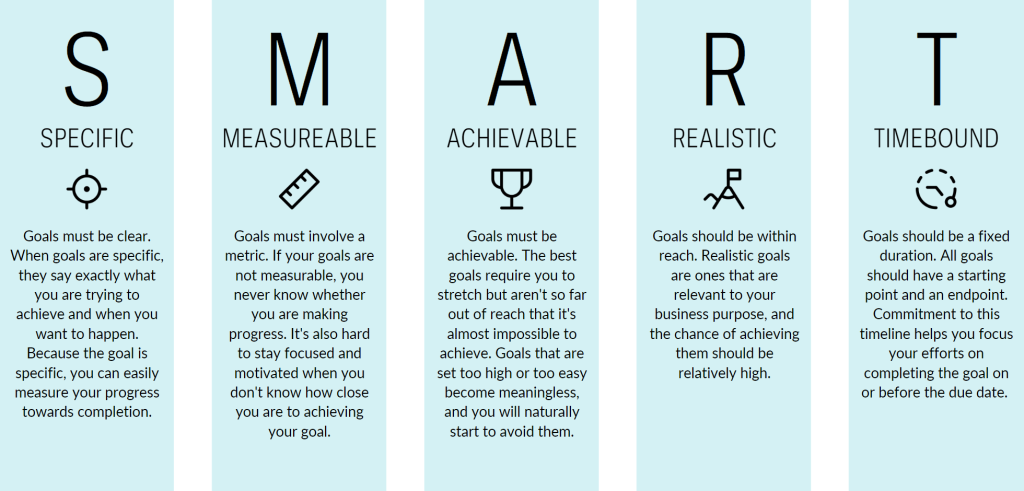Setting and achieving goals in 2023
Setting and achieving goals in 2023
Simple things to avoid so that you can excel at setting (and achieving!) goals in 2023.
As business advisors, we regularly find ourselves in conversations about how important it is to establish goals. All too often, we find our clients have completed a detailed business planning process, during which they have focused on identifying all the things they should have in place to ensure their business is best positioned for success. There is no doubt that for many, this is a key step in their business journey. However, it is important not to assume that completing a business plan is the same as establishing a set of goals. Although the two need to align, there is often a different motivator, or driver, behind them.
As a team, we got together and came up with a list of the biggest mistakes that people make when setting goals for their business – and, most importantly, how to avoid them!
Mistake #1: Forgetting the person (or people) at the centre of every business
It is very easy to create a set of brilliant goals for a business, whilst forgetting that the ability to achieve these often rests on the person, or people, who are behind the business. Very rarely do we come across businesses in the start-up or growth phases who have the ability to obtain all the resources that they need immediately for success – more often, it is a long and hard road and one that is trodden by the business owner and their families.
Make sure that the goals you set are a blend of personal and professional goals that are based on a long-term vision of what you want for yourself and your family. For example, if you want to be able to take a few weeks off with your family every year, then build this into your goal setting, so that the decisions that you make throughout the rest of the year enable this to happen.
Key things to consider when developing your business and personal goals are:
- What personal or professional development do you want in the year?
- How many hours or days do you want to be working in the business on a regular basis?
- How do you want your family to be involved in the business?
- How do you want your business to feel, for you and others involved?
- Do you want to have set holidays throughout the year?
- What sort of community positive impact do you want the business to make?
Mistake #2: Accidently motivating the wrong behaviours
Many of the business leaders that we work with forget to consider just what behaviours they are motivating with their goals. When you are setting goals, it’s really important to be aware of the link between goals and human behaviour. Your goals essentially flag to yourself and others what is most important to you and your business and provide a point of focus – and are often used as a primary measure of success.
However, before you finalise them, consider the behaviours that they are really motivating. You don’t want to find yourself in a situation where you (or others) are sacrificing other things that are just as important in order to pursue a goal that you are determined to achieve.
Consider this example of a business goal: Generate $50,000 in profit between January 2023 and December 2023. What does this mean for how these profits are generated? Are you, and your staff, going to make decisions that compromise quality or values to generate this profit? Will you start compromising the quality of customer service to generate this profit? Will you start reducing staffing hours to meet this goal?
To avoid motivating the wrong behaviours, consider:
- What does success look like?
- How do your goals align with your values?
- What behaviours or actions do you want to motivate?
- How will your goals affect everyday decision-making?
- Do you need a mixture of goals that are each of equal importance?
Mistake #3: Not applying a SMART framework
Lots of really smart people have invested a LOT of time studying goal setting, and as a result of this, have developed frameworks for structuring them in a way that sets everyone up for success. We are constantly reminding business owners to not let their hard work go to waste – look to what they have to say and how this can be incorporated into your goal-setting practices.
The most commonly used framework is ‘SMART’. In short, this means structuring your goals so that they are:

Mistake #4: Not keeping yourself and others accountable
Often, we find ourselves in conversations with business owners that have invested the time to establish a great set of goals but lose sight of them when the busy work hits. Goals are there for a reason – and if you are going to take the time to establish them, make sure that you use them in a really meaningful way, and keep yourself focused on them. There are lots of different ways that we have seen business owners remind themselves of their goals throughout the year.
Some ways to remember your goals when you’re busy include:
- Write them down and keep them handy as a visual reminder. Some people have them near their desk, others have them on their bathroom mirrors, and others have them as the desktop computer background. Choose something that will work for you.
- Incorporate them into regular meetings that you have with your team. This is not an opportunity to make people feel terrible for not achieving them, but rather an opportunity to celebrate successes, brainstorm ways to work together to achieve them and refocus.
- Use a vision board technique. There are lots of creative people in our state who are tapping into the power of using images as a meaningful way of reminding ourselves of our goals on a regular basis. Create your own by looking for inspiration on Pinterest or look into any workshops that are available in your local area.
Mistake #5: Not linking goals to a longer-term vision
All too often we see businesses that have a powerful set of short-term goals, but they fail to link these to the bigger picture. Short-term goals are great, but they should support the business to achieve a longer-term goal or vision. Consider short-term goals as laying the breadcrumbs, or the foundation, for the longer-term goals. Making this mistake can mean that you may find yourself going in a direction that is not actually want to want, or that doesn’t feel as meaningful as it otherwise could.
If you need help establishing a vision for you and your business, check out our Strategic Planning Services.
Mistake #6: Creating a set of goals in a silo
There are not many (if any!) businesses that operate in an environment that they have complete control over. Businesses that have a physical presence can be affected by changes in the surrounding environments, either in a positive or a negative way; customer needs or expectations can change, which can affect even the most loyal of your customers; staff can move on to new opportunities – the list goes on and on.
Often, we see businesses creating goals that focus only on the things that they can control in their business – and, again, whilst this is important, it can mean that you miss out on exciting opportunities. For example, what might it look like if you have a shared goal with other businesses in your immediate region to have a festival, or event, that brings more customers in? How might you work with your staff to understand their goals, so that you can meet their needs also (and keep them as part of your team!)?
The key here is to take the time to talk to others when developing your goals so that you don’t miss out on any exciting opportunities.
A final word
It’s always the right time to reflect on what you have achieved and to start to think about what you focus on going forward. Some people do this by calendar year, whilst others do this by financial year – there are certainly no rules around this, so go with whatever works for you.
Whichever you choose though, make it a part of your regular routine – and make sure that you deliberately set aside time to celebrate what you have achieved. You will no doubt be surprised at how much you have chipped away at the bigger goals throughout the year.
If you would like to chat with one of our Mentors about goal-setting in 2023, our Digital Solutions program is a great place to start. Contact us here to arrange an appointment.
GET IN TOUCH
Have questions, queries, comments? Want help solving a problem? The best way to get in touch with us is via this form.
The information collected gives us the best idea of how we can help you and what information we need to get you there.


